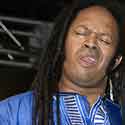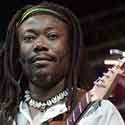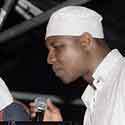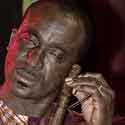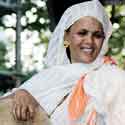The 18th Annual Afrofest
presented by Music Africa |
|
| July 8 & 9, 2006 • Queenspark • Toronto |
|
|
|
|
|
|

|
| all photos by Roger Humbert |
| Click on thumbnail details to view full-size photos.
Text below is taken from the Afrofest official guide.
|
|
| Saturday July 8 |
|
| 1:30 pm Opening Ceremony by Tapa Diarra & Kassoum Diamoutene (Mali) |
| 2:00 pm Amara Kante (Ivory Coast) |
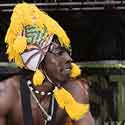 |
Amara Kante is a Malinke master of the djembe from the Ivory Coast. At age four, he began to study in the traditional manner with a master drummer and has since travelled the world with his troupe of 10 musicians. Amara Kante runs a percussion school in Marseilles, France, where he makes his home. He recently performed at Muhtadi International Drumming Festival. |
| 2:40 pm Mel M'rabet (Morocco) |
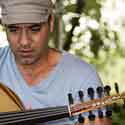 |
M'rabet's music draws not only on the rich heritage of Andalusian Music, but also on that of the Turks, the Kurds, the Armenians, and the Gypsies. All these sources have influenced his playing style and compositions. He is currently focused on developing new repertoire based on the musical roots and sources with which he grew up. In addition, he is working on a new playing technique aiding newcomers to the oud. While it is common for Western musicians to take an ornamental approach to their application of world music, M'rabet stresses that his heritage acts as the foundation for every one of his compositions. |
| 3:30 pm Carmen Souza (Cape Verde) |
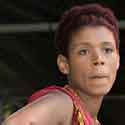 |
Carmen Souza was born 25 years ago in Lisbon within a Christian family of Cape Verdeans. At an early age she experienced the ‘Sodade’ feeling of missing someone with the long absence of her father due to his work at sea. She grew up in a mixed environment of Creole, the Cape Verde dialect her parents spoke at home, and Portuguese, always surrounded by the Cape Verdean way of life. Carmen started singing professionally at the age of 17 in a Lusophone Gospel Choir named Shout and since then she participated in several projects from funky to soul, jazz and world music, and she toured extensively.
> carmen souza
|
| 4:30 pm Ras Israel (Ghana) |
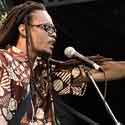 |
Ras Israel composes, arranges, and performs all of his original songs in English, Twi, Ga, Fanti and Ashanti. Ras Israel has created his own personal musical style which he dubs ‘RootsLife’, an infusion of Ghanaian highlife music with traditional roots reggae singing that puts more emphasis on the jazz, soca and reggae aspects of the music. Each and every song portrays Ras Israel's personal message of "Love and Unity for All". |
| 5:45 pm Danny Woldemichael (Eritrea) |
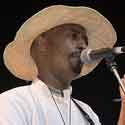 |
Danny was born and raised in Asmara, the capital of Eritrea. He picked up the krar (a five or six-stringed instrument from Eritrea and Ethiopia) at an early age, performing traditional songs and singing in his native language Tigrinya. |
| 7:00 pm Jean-Paul Samputu & Ingeli (Rwanda) |
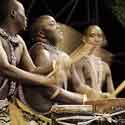 |
Samputu sings in six languages and in styles ranging from soukous, rhumba, and vodou to traditional Rwandan 5/8, Afrobeat, pygmy, and gospel. With his dance troupe Ingeli, he captivates audiences of all ages.
> www.samputu.com
|
| 8:30 pm Ed Matwawana & Afro-Musica (Angola / D. R. Congo) |
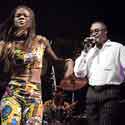 |
Ed Matwawana moved to Canada in 1983, joining his family who fled Angola in the mid-70s due to political upheaval. After graduation Ed moved to Halifax, where he performed with bands such as Duty Free, Bana Afrique and Overcomer. To quote Ed: "After only a few years in Canada, I realized that the continent of Africa was misunderstood and misinterpreted in North America. There was certainly a need to show the positive and cultural beauty that is really Africa. What better way than educating the masses through the medium of music and dance?"
> www.afromusica.ca
|
|
| Sunday July 9 |
|
| 1:30 pm Ijo Vudu Dance Troupe (Nigeria) |
| In the traditional language of the Yoruba people, Ijo Vudu (ee-joh voo-doo) refers to the transcendent spirit in dance. Led by Nigerian dance educator, performer and choreographer Sani-Abu Mohammed Allen, Toronto's Ijo Vudu is an emerging company of professional dancers and drummers from diverse backgrounds, on a journey to experience and share the joy and spirit of traditional African music and dance. > www.ijovududance.com |
| 2:20 pm Hadi Ahmed (Sudan) |
| Hadi Ahmed was born in a small Nubian village in the North of Sudan called Sawarda and was influenced profoundly in his musical experience by his family members. His grandfather Ahmed Badr was a famous kissir player as well as his father. His older brother was an oud player and singer for Mohamed Wardi, the legendary Sudanese singer.
In 1979, he started playing the oud, the traditional lute of the Middle East. In 1982, he joined Mohamed Wardi's band as a flute and piccolo player. Hadi Ahmed came to Canada in 1991 where he continued his career as a singer, oud, flute and keyboard player. He started his career as a composer and songwriter in the Nubian language and in his music he represents the traditional instrument (kissir, oud and tarr) combined with western instruments.
|
| 3:30 pm Mamadou Diabate (Mali) |
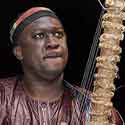 |
Mamadou Diabate is descended from a long line of Manding musician-storytellers, the Jeli, sometimes referred to by the French term griot; the traditional oral historians. A member of the famous Diabate family of Kita, Mamadou was taught by his father, who played the kora in the Instrumental Ensemble of Mali. Although his performance is based in the keita tradition, Mamadou always strives to bring something fresh, unique and contemporary to his music, making it a bridge between the past and the future. |
| 5:00 pm Muna Mingole (Cameroon) |
 |
Muma signifies "child" in Duala, one of the languages of Cameroon. Born in Paris, France, Muna Mingole arrived in Canada at age 2 with her family. Later on, she lived for eight years in Cameroon, and discovered her ancestral roots through Malimba, the beautiful island village of her ancestors. Muna is nicknamed the "Blue Flame of Cameroon". Blue, the symbol of water, characterizes values of hope, communication, courage and perseverance, and like her ancestors, Muna shares these values and transposes them into her songs. |
| 6:30 pm African Guitar Summit |
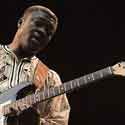 |
African Guitar Summit features the finest Canadian guitarists of African origin. This star-studded collective unites the talents of 9 musicians, each with an expertise in their individual style and together creating musical magic. Based in different parts of Canada, they first assembled in Toronto in 2004 for three days of electrifying collaboration, resulting in the album African Guitar Summit (CBC Records), which won the 2005 Juno Award for World Music Album.
Keep your eyes open for their second CD to be released later this year!
|
| 8:00 pm Sekouba Bambino & Boure Band (Guinea) |
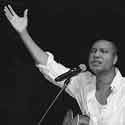 |
From his beginnings in the famous Guinean band Bembeya Jazz National, to being a member of the African-Latin supergroup Africando, to a successful solo career, this griot singer has had an extraordinary artistic career. Born Sekouba Diabate in the village of Boure Kintigna in Guinea, near the Malian border, his father and mother's families both belong to the ancestral griot caste. His mother, Mariama Samoura, was one of the most famous griot singers of her generation and had two enormous hits: "Tayer-Ke" and "Apollo". Sekouba later re-recorded these songs, as "Kassouma Ma" on his solo albums Le Destin and Kassa, and "Apollo" on the Africando albums Gombo Salsa and Live.
> www.sekouba-bambino.com
|
| 9:40 pm Closing Ceremony by Tapa Diarra & Kassoum Diamoutene (Mali) |
| Diarra Sountougoumba, known as Tapa was born in Kayes, Mali and is a descendant from a long line of griots. She is blessed with the voice of her griot mother Kandia Kouyate, a legendary Manding singer, and the talents of her Bambara griot father Bouya Diarra, one of the great traditional dancers of West Africa. Tapa Diarra is a praise singer that shares the traditions of her ancestors and her griot heritage.
Kassoum Diamoutene was born in a village tucked in the south of Mali, where the most popular and pre-dominant traditional musical instrument is the balafon (xylophone). Diamoutene has played the balafon from the age of five. He also learned to play other musical instruments such as the bara, kora, and the ngoni.
|
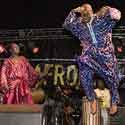 |
The balafon takes centre stage in Malian tradition and culture, and it is especially significant in the performance of various ceremonies and rites. The balafon is also a favoured instrument by praise singers or 'djelis', a centuries-old caste whose practitioners are revered because they are the keepers of records and oral history of the rich traditions of the ancient kingdoms of Mali. The 'djelis' or 'griots' help preserve their culture by reciting events from one generation to the next. |
|
| Click on thumbnail details to view full-size photos. |
|
|
|
|
|
















